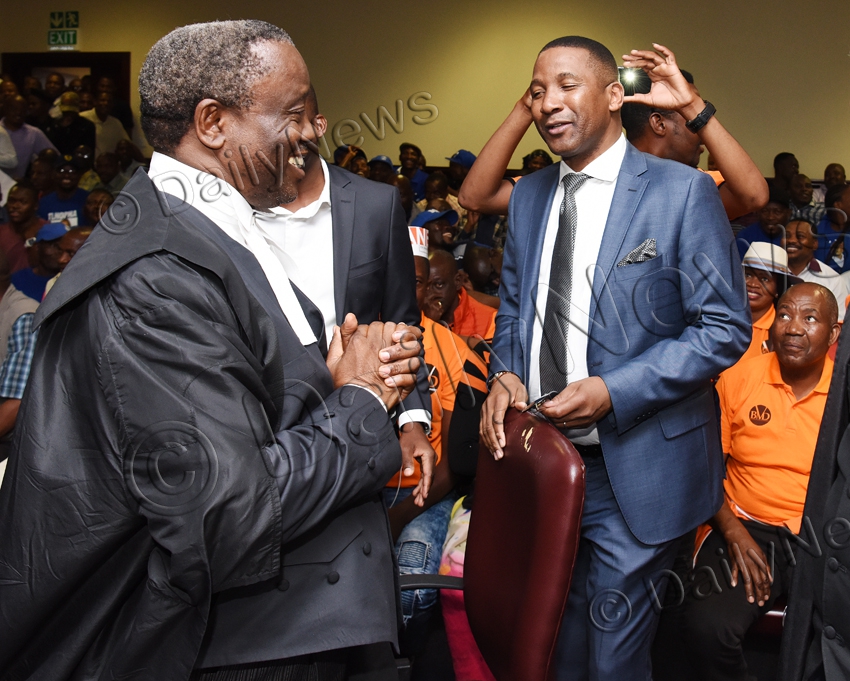Court upholds BMD expulsion
29 Aug 2019
A panel of three judges sitting at the Gaborone High Court, Justices Tshepo Motswagole, Tebogo Tau and Keborapele Moesi on August 29 afternoon dismissed an application by the Botswana Movement for Democracy (BMD) challenging its expulsion from the Umbrella for Democratic Change (UDC).
A courtroom filled to the brim broke into celebratory cheers as supporters of the UDC welcomed the decision, while those who had come to support the BMD cause silently filed out, as the court upheld the decision taken in October 2018 to remove the BMD from the opposition coalition.
Effectively, this means unless the BMD successfully appeals the decision, the UDC will contest this year’s general election comprising the Botswana National Front (BNF), Botswana Congress Party (BCP) and the Botswana People’s Party (BPP), with the BMD a separate political entity outside the coalition.
In challenging its dismissal, the BMD had argued that the National Executive Committee (NEC), which took the decision to suspend and then expel them from the UDC, was unlawfully constituted as it had not been elected in a national congress, as stipulated by the UDC constitution.
BMD had also argued that the presence of the Botswana Congress Party (BCP) in the NEC structure further compromised its legality, as due process had not been followed in admitting the BCP into the opposition umbrella body.
Furthermore, they submitted that the UDC meetings, which suspended and expelled the BMD did not form a quorum, the party had not been given prior notification of the charges against them and they had not been given a proper hearing to ventilate their response.
In countering the BMD submissions, the UDC pointed the court to the minutes of a March 4, 2013 meeting of the then umbrella negotiating team (UNT), which took a resolution to create an interim leadership consistent with Article 28 of the UDC constitution.
Article 28.1 states that ‘pending the first meeting of the national congress, the current umbrella negotiating team (UNT) which comprises presidents of the parties, secretary generals, one more negotiating officer per party and three of the five conveners of the negotiation process shall on behalf of the umbrella have the power to exercise any power vested in any structure of the party.’
The powers are further listed in Article 28 as including to ‘amend the constitution, suspend the operation of any parts of the constitution, and to appoint and remove persons from any office and to assign themselves the roles including deciding on an interim leadership.’
The UDC also argued that the BMD had willingly acceded to the March 4 2013 decision by the UNT to create an interim leadership made up of party representatives and that since a national congress had not been held since, the decision remained binding.
In pronouncing its decision, the court described the arguments made by the BMD as unconvincing, since the BMD had been party to the March 4 2013 decision, and had never at any point questioned it.
The court noted that the BMD had always had office bearers that participated in the interim UDC NEC structure in clear acknowledgement of the March 4 2013 resolution, and only questioned its legitimacy in a responding affidavit while appealing their dismissal from the UDC.
Justice Moesi who read the judgment, said precedence in court was that arguments made in a responding affidavit were secondary considerations, and that if the BMD had felt the need to challenge the March 4 2013 resolution, they should had done so in their original affidavit.
Justice Moesi noted that records showed that on February 10, 2016, leaders of the BNF, BCP, BPP and BMD met to negotiate the inclusion of the BCP, and UDC leader Mr Duma Boko, who chaired the meeting was recorded as reminding the meeting of the 2013 resolution to utilise Article 28 of the UDC constitution to have an interim leadership since a congress had not yet been held.
This was not disputed by the BMD who were present, and subsequently, BMD secretary general Mr Gilbert Mangole wrote to the Registrar of Society informing of the inclusion of the BCP in the UDC, and he also was part of a press conference that announced the decision to include the BCP. Justice Moesi said the meetings which suspended and expelled the BMD formed quorum, as three of the four parties, the BNF, BCP and BPP were present.
Regarding the BMD argument of ‘lack of notice and lack of due process,’ the court noted that it was on record that the minutes of a September 18, 2018 hearing held by the UDC NEC had the presence of BMD President Mr Sydney Pilane and Secretary General Mr Mangole, and by the time they left the meeting they had been made aware of UDC charges against the BMD.
On September 26 2018, the BMD was furnished with a letter of suspension, and The decision to expel the party was formally communicated October 26, 2018.
As such, the court ruled that arguments presented by the BMD had been without merit, and the UDC as a legally constituted voluntary organization had used the right structure and followed due process to expel the BMD. Furthermore, the BMD was ordered to pay costs. Ends
Source : BOPA
Author : Pako Lebanna
Location : Gaborone
Event : Court case
Date : 29 Aug 2019








